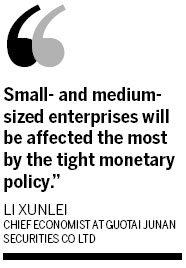Statistics
China's corporate performance stalls
By Chen Jia (China Daily)
Updated: 2011-04-09 10:01
 |
Large Medium Small |
A decline in the Business Climate Index signals concerns over policy
BEIJING - China's Business Climate Index, a main gauge of corporate performance, declined to 133.8 in the first quarter of this year, from a three-year high of 138 in the last quarter of 2010, the National Bureau of Statistics (NBS) said on Friday. The retreat signals increasing concerns about the country's monetary tightening policy and interest rate rises.
While the index declined by 4.2 points from the fourth quarter of 2010, based on a survey of 20,000 Chinese companies, it still showed signs of economic expansion, said a statement on the NBS website.
The increasing cost of borrowing may slow the pace of economic growth, and increase pressure on Chinese companies, a separate report from HSBC Holdings Plc said on Friday.
The NBS sub-index for the real estate industry decreased the most among all surveyed sectors to 135.3 in the first three months, from 148.4 in the fourth quarter of last year, according to the statement.
"Annual reports from some listed real estate companies already indicated tight cash flows because of restrictions on home purchases and the rising cost of borrowing," said Wang Ren, chief strategy analyst at Ping An Securities Company Ltd.

After a marked decline in property sales during March, some of the capital currently invested in the real estate sector may move to the stock markets in the next few months, said Wang.
According to the NBS figure, the sub-index for small companies fell to 114.1, 2 points lower than in the last three months of 2010. The measure for medium-sized companies was 133.5, and 157.2 for large businesses.
Nine consecutive rises in the required reserve ratios for banks since the start of 2010 mean that companies are finding it increasingly difficult to borrow money from banks, especially small- and medium-sized operators, said Li Xunlei, chief economist at Guotai Junan Securities Co Ltd.
"Small- and medium-sized enterprises will be affected the most by the tight monetary policy," Li said.
China's central bank raised the benchmark one-year leading rate by a quarter of a percentage point to 6.31 percent, and lifted the deposit rate to 3.25 percent on Tuesday - the fourth increase in interest rates in less than six months - to tame inflation and curb asset bubbles.
Guotai Junan's Li said that there may be one more interest rate hike sometime in the first half of the year, but the required reserve ratios are already so high they will probably remain unchanged.
The business climate sub-index for the retail sector came in at 153.2, a rise of 3.6 points from the last reading, the highest among all industries. In the IT sector, the measure decreased to 150.4 in the first quarter from the previous figure of 159.7.
Another business performance indicator, the Index of Entrepreneur Confidence, was also released by the NBS on Friday. The figure for the first quarter was 137.4, unchanged from the last three months of 2010.
Entrepreneur confidence dropped the most in the real estate industry to 112.3, but rose in the retail and social services sectors, said the NBS.
| 分享按钮 |



